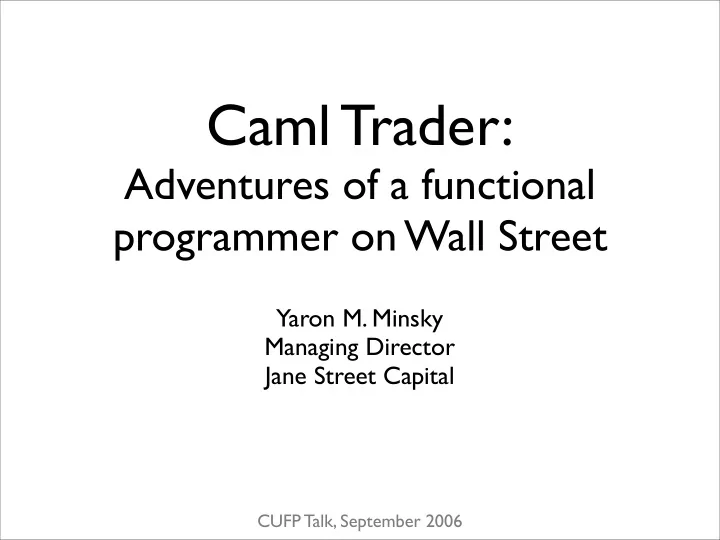

Caml Trader: Adventures of a functional programmer on Wall Street Yaron M. Minsky Managing Director Jane Street Capital CUFP Talk, September 2006
How I got here... • Finished PhD in Distributed Systems at Cornell – No finance background • Spent a year consulting 1/2 time with Jane Street, doing quantitative research • Trading is more fun! Jumped ship in 2003 CUFP Talk, September 2006
Jane Street (circa 2003) • Small proprietary trading company (No customers!) • Quantitative trading (esp. arbitrage and market making) • Very hush-hush • Basic technology – Mostly Excel and VB, (and some C#, Java and C++) CUFP Talk, September 2006
Excel and VB? • Excel is a great tool! • Rapid development • Makes (some) errors easy to catch • Most common FP language out there • VB fits Excel like a glove CUFP Talk, September 2006
...but it couldn’t last • Poor performance • Nearly impossible to version control • Too much cut&paste • Attempts to rewrite key infrastructure in C# had stalled • Too verbose • Too complex CUFP Talk, September 2006
The OCaml Experiment • Quant group had been using OCaml since 2002, with good results • Early 2005, management decided to give OCaml a try • Experimental Project: rewrite key trading systems in OCaml CUFP Talk, September 2006
FP as a recruitment strategy • Lots of great Java programmers out there, but how to find them? • Small number of great FP hackers, but fewer great jobs in industry • OCaml is a signal of quality, in both directions • See Paul Graham’s “The Python Paradox” CUFP Talk, September 2006
Readability • Code quality taken very seriously • Partners review much of the code that goes into production systems • OCaml was easier to review and reason about. • Terse, easy to avoid boilerplate • Type system as proof assistant CUFP Talk, September 2006
Robustness • It’s hard to write reliable imperative code (but we do) • Types are essential • Small features matter: labeled arguments and polymorphic variants • Type-inference makes it easier to change code quickly and reliably CUFP Talk, September 2006
Performance • High performance requirements: 100,000’s of txns/sec, sub-millisecond latency • OCaml generates fast code • Performance is easy to understand (mostly) • Good and fast FFI CUFP Talk, September 2006
How did it go? • Within 6 months, a number of key systems had been rewritten • Performance far better • Better modularity (most code reused between systems) • Much shorter (even not counting reuse) • New systems implemented strategies more complex than previously possible CUFP Talk, September 2006
Problems • Harder to support Windows • Hard to take advantage of SMP systems • OCaml has limited GUI toolkit support CUFP Talk, September 2006
Jane Street Now • OCaml Everywhere: Research, Trading Strategies, Systems Administration, Monitoring tools... (VB and Excel still around) • Team of 10 programmers and researchers working primarily in OCaml • 1/2 of core infrastructure is now rewritten (and working on the other half) • 250kloc of OCaml, and growing fast CUFP Talk, September 2006
Lessons • Languages matter, people matter more • Leadership that understands technology is a must • FP is a real competitive edge for a company nimble enough to use it CUFP Talk, September 2006
We’re Hiring yminsky@janestcapital.com CUFP Talk, September 2006
Recommend
More recommend